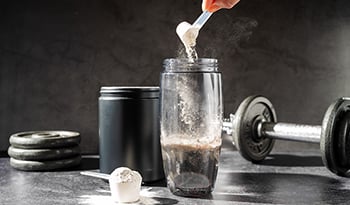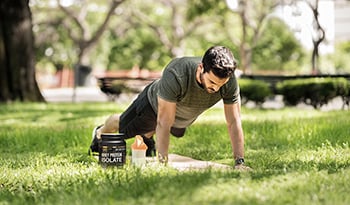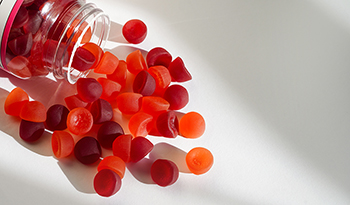3 Supplements That Can Benefit Beginner Lifters
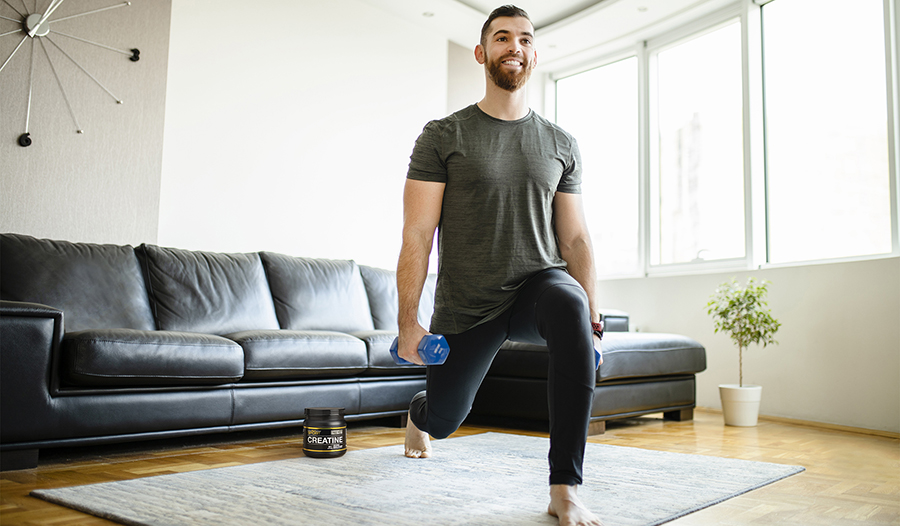
Taking the first steps on your weight training journey? Those early weeks and months are some of the most gratifying you’ll encounter throughout your lifting experience. Everything is new for your body, so your body adapts quickly to your training and you enter a phase called the “newbie gains.”
In the newbie gains phase, you can reap big benefits from your training. Your body responds with sharp increases in strength and potentially big body composition shifts too. While each person’s newbie gains phase looks slightly different due to training history, genetics, and many other factors, everyone has the potential to capitalize on this phase.
When I think about my first year of lifting, there is a lot that I got right—and just as much that I got wrong. One mistake I made that I think a lot of other beginner lifters repeat was blindly buying supplements without understanding the “why” behind them.
To be clear, beginner lifters do not need supplements to make gains. However, if you are all in on your training and want to invest in supplements to support your progress, I recommend three supplements for beginner lifters:
Let’s dive in and discuss why these supplements can support your training, how to take them, and additional supplements you might consider as you get further along your personal weight training journey.
Protein Powder
Whether your goal is building muscle, losing body fat, or just getting healthier in the weight room, hitting your recommended daily protein intake can be an awesome way to ensure you’re helping your body recover and perform at its best.
Of all the macronutrients, protein is arguably the most important for tackling different training goals as it plays a direct role in repairing and building new muscle. As a beginner, you are primed to capitalize on quick and steady gains, so consuming enough protein is key.
Often, when beginners start training, they increase their daily protein intake. However, many new lifters don’t realize that meeting protein targets with traditional foods and their normal eating habits can be more difficult than they expect.
Protein powder can be an awesome tool for helping lifters from all walks of life achieve their daily protein intake goals. There are countless types of protein powder on the market—so whether you eat dairy-free, plant-based, or vegan, you can find a powder for your needs. And most protein powders include all essential amino acids, making them complete protein sources.
You can consume protein powders quickly and conveniently any time of the day, making them one of the easiest ways to meet your protein needs. Below are some of my favorite ways to consume protein powder:
- Post-workout shake: Perhaps the simplest way to enjoy protein powder, just mix up a shake and consume it after your workout.
- Protein oats: Mix protein powder with your oatmeal in the morning. Add cinnamon and fruit for a burst of flavor, more fiber, and added antioxidants.
- Smoothies: Protein powder helps make a delicious, nourishing smoothie. Include nut butter, your favorite fruit, and yogurt for a tasty smoothie snack.
How Much Should I Take?
As a rule of thumb, consuming between 0.8 to 1 grams of total protein per pound of body weight daily is a good starting point for most beginner lifters. Keep in mind, this target includes both proteins you get from a powder as well as protein from the foods you consume.
Creatine
Creatine is a tried and true, affordable supplement. Of all the supplements on the market, few have been researched as much as creatine. In fact, some refer to creatine as the number-one supplement for improving athletic performance.
Creatine may provide multiple benefits, including assisting with recovery, increasing lean muscle mass, supporting power production, and promoting performance during high-intensity exercise. And research suggests creatine benefits athletes of all levels, from those just starting out on their weight training journey to experienced lifters with years of training under their belts.
How Much Should I Take?
Creatine comes in multiple forms. I recommend starting with 5 grams of creatine monohydrate daily. You may have heard of “creatine loading,” which involves taking higher doses of creatine multiple times a day to rapidly increase your body stores. I don’t feel this is necessary.
You can also choose one of the other creatine variants—however, if you want to save money and use a well-tested supplement, creatine monohydrate is an excellent choice.
Generally, I recommend consuming creatine after you work out, as it can assist with recovery. However, some lifters prefer to take their creatine pre-workout, as it may assist with performance in some contexts.
As a beginner, try not to stress over these details too much. Simply set your goal to get in your creatine each day. Creatine is tasteless, so you can easily consume it with a glass of water.
Magnesium
Another fantastic supplement that is often overlooked by beginners, intermediates, and advanced athletes alike is magnesium. Magnesium is a mineral that plays a role in hundreds of processes in the body.
Magnesium is called the calming supplement because of its potential to help the nervous system calm down and relax after busy days. In the context of weight training, magnesium can help support energy levels, sleep, muscle function, nervous system health, and much more.
As with creatine, there are several types of magnesium supplements on the market. Magnesium citrate is both affordable and bioavailable, meaning your body can absorb it easily. Magnesium glycinate is another good, albeit slightly more expensive, option. Try to avoid magnesium oxide, since it has relatively poor bioavailability—meaning your body isn’t able to absorb it well.
How Much Should I Take?
The Recommended Dietary Allowance (RDA) for magnesium is 400 to 420 mg for adult men and 310 to 320 mg for adult women. Pregnant adults require 350 to 360 mg of magnesium.
Research shows most people do not meet their recommended magnesium intake through food alone, so most of us should consider supplementing this important mineral. I recommend taking your magnesium supplement at night about 30 minutes before bed.
High doses of magnesium supplements can lead to diarrhea and gastrointestinal upset, so consult your dietitian or other qualified healthcare practitioners to find the right dose for you.
Runner-Up Supplements
Beyond these top three supplements for beginner lifters, a few others may be worth investigating if you’re looking to optimize your training.
- Vitamin D: Also known as the sunshine vitamin, vitamin D is an important supplement during the winter months when you may not be getting adequate levels of sun exposure. Vitamin D plays many important roles in the body and can positively benefit your training.
- Beetroot juice: If you’re more of an endurance-focused athlete and lifter, beetroot juice can be another fantastic option to explore. This supplement can be useful for promoting blood flow.
- Multivitamin: Generally, I’m not the biggest fan of multivitamins. However, if you know you’re not consuming ample whole foods daily, a multivitamin can help fill any gaps and ensure you’re getting enough nutrients. Multivitamins are not a replacement for a nutritionally-dense diet, but they’re useful as insurance to make sure you’re meeting all of your needs—especially on days when you’re not able to eat optimally.
Other Beginner Lifter Tips
Here are several other useful tips that can help boost your progress when starting out on your weight training journey. These are things I believe every lifter and coach prioritized for themselves early in their training careers—and things you should prioritize as well if you want to maximize your success.
- Get enough sleep: Create a bedtime routine and make getting enough sleep a top priority in your life. You can’t out-train poor recovery and sleep is the best natural recovery tool we all have access to.
- Be consistent: Follow a consistent training plan and try not to modify it or skip ahead too much. Too often, beginners program hop and neglect to master the foundations. By staying the course, you’ll be better equipped throughout your entire lifting career.
- Train with a coach: Work with a trainer or coach if you can. When you’re starting out, it’s always helpful to have a second set of eyes on your training, nutrition, and recovery. A trainer or coach can help you identify your blind spots, too.
- Stay hydrated: Keep an eye on your daily hydration levels. Avoid feeling thirsty—once you’re thirsty you’re already dehydrated. Some people find it helpful to carry around a filled water bottle and set timers throughout the day reminding them to drink.
As always, before starting any new supplements, consult with a dietitian or other qualified medical professional to ensure you’re taking the right supplements at the right doses for your individual needs.
References:
DISCLAIMER:This Wellness Hub does not intend to provide diagnosis...















































































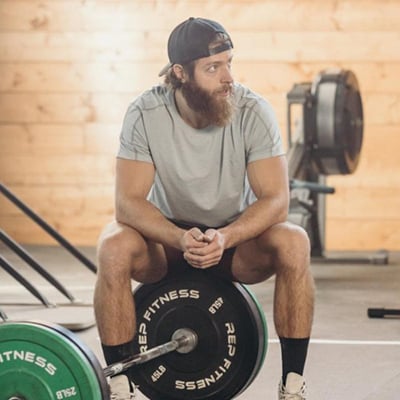
 Table of Contents
Table of Contents






